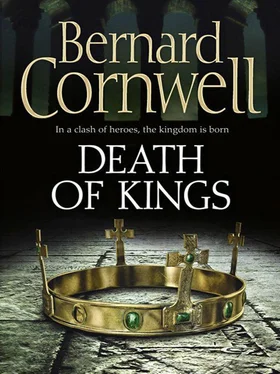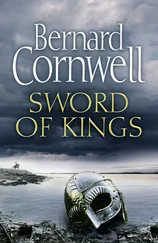Priests were walking down our line. Men knelt to them and the priests blessed them and put pinches of mud on their tongues. ‘This is Saint Lucy’s Day,’ one priest called to the shield-warriors, ‘and she will blind the enemy! She will protect us! Blessed Saint Lucy! Pray to Saint Lucy!’
The rain had stopped, though much of the winter sky was still shrouded by cloud beneath which the enemy banners were bright. Sigurd’s flying raven and Cnut’s shattered cross, Æthelwold’s stag and Beortsig’s boar, Haesten’s skull and Eohric’s weird beast. There were lesser jarls among the enemy ranks and they had their own symbols; wolves and axes and bulls and hawks. Their men shouted insults and beat their weapons on their shields, and slowly they came forward, a few steps at a time. The Saxons and East Anglians of the enemy army were being encouraged by their priests, while the Danes were calling on Thor or Odin. My men were mostly silent, though I suppose they made jokes to cover their fear. Hearts were beating faster, bladders emptying, muscles shaking. This was the shield wall.
‘Remember!’ the Centish priest shouted, ‘that Saint Lucy was so filled with the Holy Spirit that twenty men could not move her! They harnessed a team of oxen to her and still she could not be moved! That is how you must be when the pagans come! Immovable! Filled by the Spirit! Fight for Saint Lucy!’
The men who had gone eastwards had vanished in a morning mist that seeped from the marshes. There were so many of the enemy, a horde, a killing horde, and they came closer still, a hundred paces, and horsemen galloped in front of their tightknit shield wall and called encouragement. One of those horsemen slewed towards us. He wore bright mail, thick arm rings and a glittering helmet, and his horse was a magnificent beast, newly groomed and oiled, its harness bright with silver. ‘You’re going to die!’ he shouted at us.
‘If you want to fart,’ I shouted back, ‘go to your own side and stink them out.’
‘We’ll rape your wives,’ the man called. He spoke in English. ‘We’ll rape your daughters!’
I was happy enough that he should call such hopes, for they would only encourage my men to fight. ‘What was your mother?’ a Centishman called back. ‘A sow?’
‘If you lay your weapons down,’ the man shouted, ‘then we shall spare you!’ He turned his horse and I recognised him. He was Oscytel, Eohric’s commander, the brutal-looking warrior I had met on Lundene’s wall.
‘Oscytel!’ I shouted.
‘I hear a lamb bleating!’ he called back.
‘Get off your horse,’ I said, taking a step forward, ‘and fight me.’
He rested his hands on his saddle’s pommel and stared at me, then he glanced at the flooded ditch that had sheets of thin ice crusting its water. I knew that was why he had come, not just to insult, but to see what obstacle faced the Danish charge. He looked back to me and grinned. ‘I don’t fight old men,’ he said.
That was strange. No one had ever called me old before. I remember laughing, but there was shock behind my laughter. Weeks before, talking with Æthelflaed, I had mocked her because she was staring at her face in a great silver platter. She was worried because she had lines about her eyes and she had responded to my mockery by thrusting the plate at me, and I had looked at my reflection and seen that my beard was grey. I remember staring at it as she laughed at me, and I did not feel old even though my wounded leg could be treacherously stiff. Was that how people saw me? As an old man? Yet I was forty-five years old that year, so yes, I was an old man. ‘This old man will slit you from the balls to the throat,’ I called to Oscytel.
‘This day Uhtred dies!’ he shouted at my men. ‘And you all die with him!’ With that he circled his horse and spurred back towards the Danish shield wall. Those shields were eighty paces away now. Close enough to see men’s faces, to see the snarls. I could see Jarl Sigurd, magnificent in mail and with a black bear’s pelt humped from his shoulders. His helmet was crested with a raven’s wing, black in the dawn’s grey light. I could see Cnut, the man with the quick sword, his cloak white, his thin face pale, his banner the broken Christian cross. Sigebriht was beside Eohric, who in turn was flanked by Æthelwold, and with them were their fiercest, strongest warriors, the men who had to keep the kings and the jarls and lords alive. Warriors were touching crosses or hammers. They were shouting, but what they bellowed I could not tell because the world seemed silent in that moment. I was watching the enemy ahead, judging which one would come to kill me and how I would kill him first.
My banner was behind me and that banner would attract ambitious men. They wanted my skull as a drinking cup, my name as a trophy. They watched me as I watched them and they saw a man covered in mud, but a warlord with a wolf-crested helmet and arm rings of gold and with close-linked mail and a cloak of darkest blue hemmed with golden threads and a sword that was famous throughout Britain. Serpent-Breath was famous, but I sheathed her anyway, because a long blade is no help in the shield wall’s embrace, and instead I drew Wasp-Sting, short and lethal. I kissed her blade then bellowed my challenge at the winter wind. ‘Come and kill me! Come and kill me!’
And they came.
The spears came first, launched by men in the third or fourth enemy ranks, and we took them on our shields, the blades thumping hard into the willow, and the Danes were screaming as they rushed us. They must have been warned about the ditch, but even so it trapped scores of men who tried to leap it and instead skidded on our bank, their feet flying out from under them as our long-hafted axes flashed down. When we practise the shield wall I put an axeman next to a swordsman, and the axeman’s job is to hook his blade over the rim of the enemy’s shield and haul it down so the sword can slide over the top and into the enemy’s face, but now the axes crunched down through helmets and skulls and suddenly the world exploded in noise, in screams, in the butcher’s sound of blades cleaving skulls, and the men behind the Danes’ first rank were pushing through the ditch and their long spears were thumping into our shields. ‘Close up!’ I bellowed. ‘Shields touching! Shields touching! Forward a pace!’
Our shields overlapped. We had spent hours practising this. Our shields made a wall as we pushed forward to the ditch’s edge where the steepness of the slick bank made the killing easy. A fallen man tried to stab his sword up under my shield, but I kicked him in the face and my iron-reinforced boot slammed into his nose and eyes and he slid back and I was thrusting Wasp-Sting forward, finding the gap between two enemy shields, ramming the stiff short blade through mail into flesh, shouting, always watching their eyes, seeing the axe come down and aware that Cerdic, behind me, caught it on his shield, though the force of the blow hammered his shield down onto my helmet and for a moment I was dazed and blinded, but still grinding Wasp-Sting forward. Rollo, beside me, had hooked a shield down and as my vision cleared I saw the gap and flicked Wasp-Sting into it, saw her tip take an eye, skewered it hard. A massive blow hit my shield, splintering a board.
Cnut was trying to reach me, bellowing at his men to make space, and that was foolish because it meant they lost their cohesion to let their lord come to the killing place. Cnut and his men were in a frenzy, desperate to break our wall, and their shields were not overlapping and the ditch trapped them and two of my men drove spears hard into the oncoming men. Cnut tripped on one and sprawled in the ditch and I saw Rypere’s axe smash into his helmet, only a glancing blow, but hard enough to stun him because he did not get up. ‘They’re dying!’ I shouted. ‘Now kill all the bastards!’
Читать дальше
Конец ознакомительного отрывка
Купить книгу












